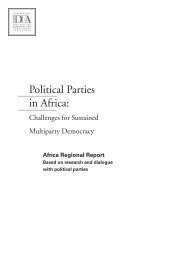Background Document - Danish Institute for Parties and Democracy
Background Document - Danish Institute for Parties and Democracy
Background Document - Danish Institute for Parties and Democracy
You also want an ePaper? Increase the reach of your titles
YUMPU automatically turns print PDFs into web optimized ePapers that Google loves.
OPENING SPACES AND INCREASING ACCESS<br />
´ Adoption <strong>and</strong> implementation of positive measures: Legislated quotas to get women into<br />
the spaces <strong>for</strong> decision making is an urgent priority to reduce the representation gap of<br />
women in politics. As it is not only men who are always unconvinced of women’s right <strong>and</strong><br />
capacity to participate in public life, the measures that are advocated <strong>for</strong> <strong>and</strong> put in place<br />
have to be rein<strong>for</strong>ced with public awareness campaigns on women’s participation <strong>and</strong> representation.<br />
This is because obstacles to women’s participation in all political processes<br />
including transitional processes stems from a range of political <strong>and</strong> electoral structures<br />
<strong>and</strong> processes <strong>and</strong> cultural patterns opposing women’s participation in public life.<br />
´ Political parties, movements, groups: Developing political parties’ capacity to analyse their<br />
intra-party processes, rules <strong>and</strong> regulations on the identification, nomination <strong>and</strong> selection<br />
of c<strong>and</strong>idates <strong>for</strong> elective positions within the political parties <strong>and</strong> into public positions<br />
of power <strong>and</strong> decision making. This will involve providing examples to political parties<br />
on how they can be conduits women’s empowerment.<br />
´ Male advocates: Working with men <strong>and</strong> designing initiatives that sys-tematically engage<br />
men <strong>and</strong> boys in women’s empowerment <strong>and</strong> gender equality promotion <strong>and</strong> making men<br />
equally responsible as women <strong>for</strong> the achievement of women’s empowerment. This is involves<br />
encouraging men to relinquish some of their power in order <strong>for</strong> women to have a<br />
fair share in political participation <strong>and</strong> representation.<br />
POWER OF THE MEDIA<br />
´ Mobilisation of media support: The way women are portrayed in the media has enormous<br />
impact on women’s participation <strong>and</strong> representation in processes <strong>and</strong> positions of transitional<br />
decision making. Working with the media to provide balanced coverage of women<br />
<strong>and</strong> men <strong>and</strong> equality issues is an essential strategy <strong>for</strong> supporting women in politics <strong>and</strong><br />
in transitions.<br />
´ Advocacy to end gender based violence: The media is an effective tool to fight violence<br />
against women <strong>and</strong> girls as this remains a global p<strong>and</strong>emic. Women’s particular vulnerability<br />
to gender based violence is one of the most obvious deterrent <strong>for</strong> women’s participation<br />
in political transitions. Media advocacy to address the underlying gender inequalities<br />
that are the key drivers of gender based violence is a vital strategy.<br />
BIBLIOGRAPHY<br />
The Arab Spring is looking like a great leap backwards <strong>for</strong> women, Article by Hoda Badran, Summer 2012.<br />
Progress of the World’s Women 2008-2009: Who Answers to Women, UN Women (2008).<br />
Women’s Movements <strong>and</strong> Democratic Transition in Chile, Brazil, East Germany <strong>and</strong> Po-l<strong>and</strong>, Lisa Baldez,<br />
Comparative Analysis, 2003.<br />
Unfinished Transitions: Women <strong>and</strong> the Gendered Development of <strong>Democracy</strong> in Venezuela 1936-1996,<br />
Elizabeth J Friedman (2000).<br />
No shortcuts to Power: African Women in Politics <strong>and</strong> Policy Making, Anne Marie Goetz <strong>and</strong> Shireen Hassim<br />
(Editors), 2003.<br />
The Role of Women in Rw<strong>and</strong>a’s Transition, Elizabeth Powley, 2003.<br />
Women <strong>and</strong> Democratization: Conceptualising Gender Relations in Transition Politics, Georgina Waylen,<br />
World Politics, Vol 46, No. 3(April 1994), pp 327-354.<br />
Women in Transitions, Fast Facts UNDP Tunisia, July 2011.<br />
Women’s Political Participation in the Great Lakes Countries Emerging from Conflict, International Alert<br />
Report(2007).<br />
WOMEN IN POLITICS DANISH INSTITUTE FOR PARTIES AND DEMOCRACY PAGE 43
















